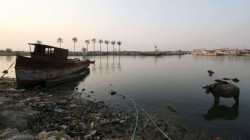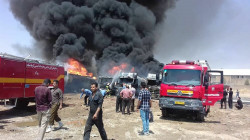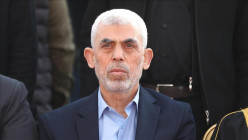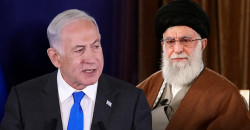Iran-Israel conflict: Iraq caught in the crossfire
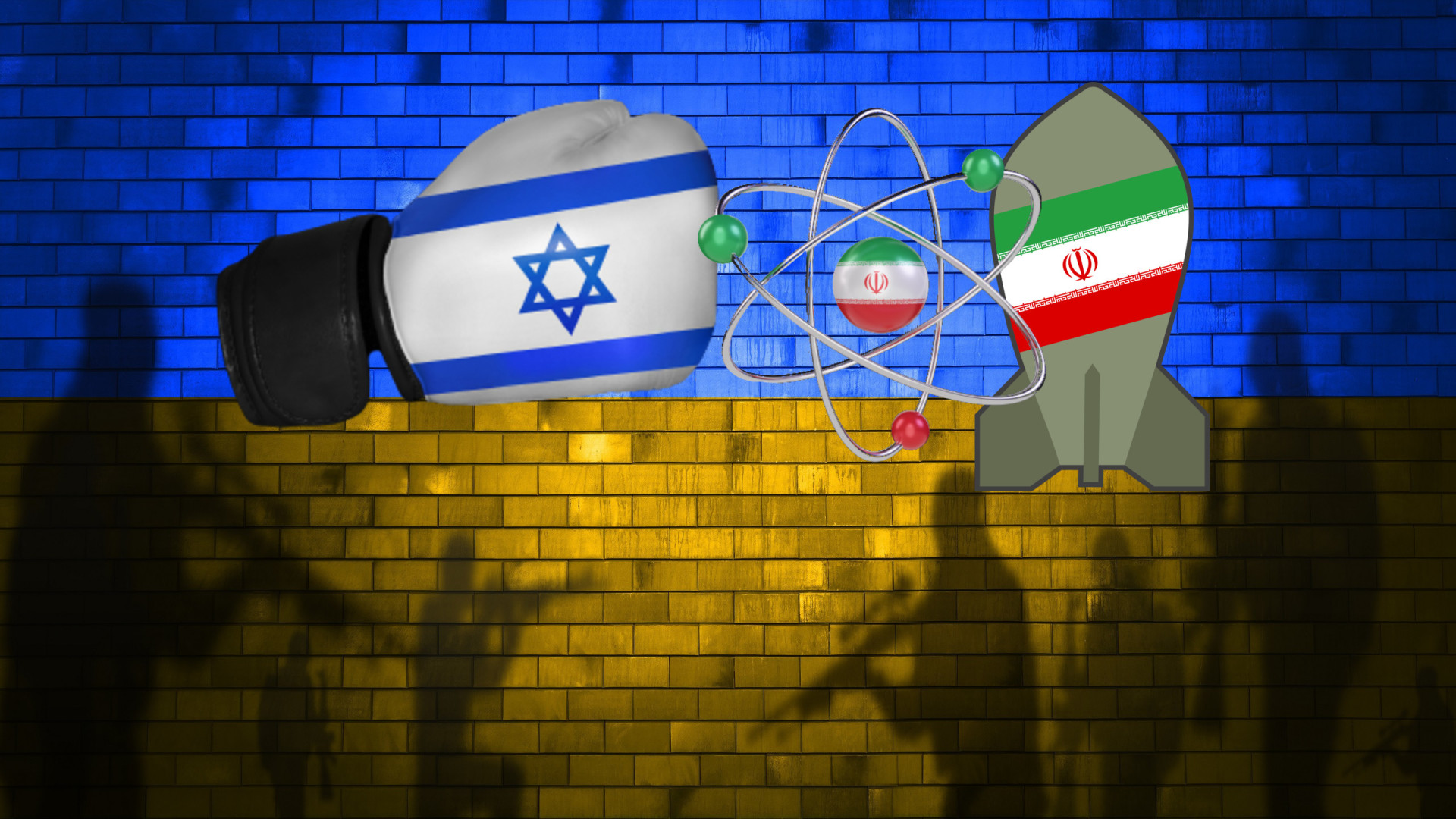
Shafaq News/ The recent strike by Iran against Israel in response to the targeting of its annex in Damascus has sent ripples of caution throughout the Middle East. This event has heightened apprehensions about the potential fallout on Iraq as the region braces for a possible escalation into a regional war, with the involvement of various factions, including Iraqi elements.
WHAT HAPPENED?
Iran launched explosive drones and fired missiles directly at Israel late on Saturday, marking its first direct assault. This retaliatory strike has heightened the threat of a broader regional conflict, with the United States pledging unwavering support for Israel.
Iran's Islamic Revolution Guard Corps (IRGC) Aerospace Force declared a retaliatory operation named "Truthful Promise," targeting Israeli positions in occupied Palestine.
The IRGC's Aerospace Force said the "Truthful Promise" was launched to "punish the criminal Zionist regime."
Sirens blared across Israel as residents reported hearing distant explosions, likely stemming from aerial interceptions of explosive drones.
Some of the ballistic missiles from Iran targeted the "Nevatim" Air Base in the al-Naqab desert, according to reports from the Islamic Republic News Agency (IRNA) on Sunday.
IRNA noted that Israeli attacking jets had taken off from "Nevatim" to conduct the assault on the Iranian embassy in Syria.
Earlier statements from Iranian officials alleged that F-35 fighter jets were used in the attack, launching six missiles at the consular section of the Iranian embassy.
The Israeli military reported that the Iranian barrage, consisting of over 200 drones and missiles, caused minor damage to a single military facility.
Israel initially issued alerts to residents to prepare for shelter but later revised this stance, indicating that the immediate threat had subsided. Nonetheless, Israeli officials vowed a "significant response" to the attack, as tensions remain high in the region.
Rear Admiral Daniel Hagari, Israel's military spokesperson, revealed that Iran had launched numerous ground-to-ground missiles, most of which were intercepted outside Israeli borders. The successful interception, including cruise missiles, was described as a "strategic achievement."
"25 of the 30 cruise missiles were shot down by Israel." He added.
The White House statement condemned the attacks by "Iran—and its proxies operating out of Yemen, Syria, and Iraq—(that) launched an unprecedented air attack against military facilities in Israel."
According to the readout, the US military deployed aircraft and ballistic missile defense destroyers to the region over the past week. "Thanks to these deployments and the extraordinary skill of our servicemembers, we helped Israel take down nearly all of the incoming drones and missiles."
During the call with Prime Minister Netanyahu, the US president "reaffirmed the US's ironclad commitment to the security of Israel. I told him that Israel demonstrated a remarkable capacity to defend against and defeat even unprecedented attacks – sending a clear message to its foes that they cannot effectively threaten the security of Israel."
IN TEHRAN TIME
Mohammad Mehdi Shariatmadari, an expert in Iranian and regional affairs, has emphasized Iran's strategic approach in response to recent provocations.
Shariatmadari pointed out Iran's strategic calculations, stating that "Iran does not succumb to Israeli and American provocations despite the repeated announcements of Iran's response timing against Israel, the latest being yesterday."
Shariatmadari told Shafaq News agency that "Iran is evaluating the situation and the potential outcomes of any military action, considering the effects that this operation or the possible Israeli response could have on various countries and powers in the region. It is choosing the appropriate time, place, and response."
He stressed that "the Zionist entity bears responsibility for its crime committed against the Iranian consulate in Damascus. While not the first crime, this one stood out as the entity violated all international laws by targeting a diplomatic mission and infringing on both Syrian and Iranian sovereignty. These crimes must be curbed."
He continued, "Additionally, the Axis of Resistance stands alongside Iran and the Islamic resistance in Palestine. Ansarallah has halted Israeli navigation and ships heading towards Israel, while Hezbollah in Lebanon conducts daily operations against Israel. Therefore, the regional and international stance is favorable and grants Iran the right to defend its interests."
OUTBREAK OF A REGIONAL WAR
The US President Joe Biden told Israeli Prime Minister Benjamin Netanyahu during a call on Saturday that the US will not support any Israeli counterattack against Iran, a senior White House official told Axios.
According to Axios sources, the official said that when Biden told Netanyahu that the US would not participate in any offensive operations against Iran and would not support such operations, Netanyahu said he understood.
On the other hand, a senior White House official stated, according to CNN, that "Biden clarified to Netanyahu that Washington would not participate in any military operations against Iran."
These statements aligned with US Defense Secretary Lloyd Austin's remarks after the Iranian attack on Israel, stating that "Washington is not seeking a conflict with Tehran."
Moreover, NBC News reported that senior officials in the Biden administration, along with senior defense officials, have voiced concerns about potential swift actions by Israel in response to the Iranian attack.
According to three informed sources cited by NBC News, President Biden has privately expressed concerns that Prime Minister Netanyahu might seek to draw the United States into a broader conflict.
The White House statement did not express concern or rejection of any Israel response to the Iranian attack.
"All countries hosting American bases in the region have announced their refusal to allow America to escalate against Iran, including Qatar, Saudi Arabia, the UAE, and Turkiye," Shariatmadari said.
In this regard, Dr. Hakam Amhaz, a researcher in Iranian affairs, told Shafaq News that the Islamic Republic of Iran has opted to respond directly to Israeli assaults, "disrupting the balance that Israel aims to establish by targeting Iranian interests overseas in return for the presence of Iranian advisors in Syria. As a result, the situation has departed from its usual context and the customary rules of engagement between the involved parties."
"Iran's response may lead to a counter-response, and the back-and-forth may escalate into a regional war, which would have significant consequences. Iran will not stand alone in this battle; the entire Axis of Resistance will be present."
He argued that the United States is "unprepared for this battle for many reasons."
"The United States is currently grappling with presidential elections, profound crises, and internal rifts within American society, exacerbated by recent hostilities in Gaza. Furthermore, there is a notable lack of support for President Joe Biden and the Democratic Party, which is experiencing its own internal divisions. Meanwhile, the crisis in Ukraine has sparked discord within Europe, the United States, and NATO, intensifying the ongoing geopolitical tensions between the US, Russia, and China." Dr. Amhaz explained.
He points out, "If a conflict erupts in the region, it will present a substantial economic risk globally due to its central and sensitive nature. Acting as a bridge between the East and West, it enables transporting goods, oil, and other commodities via land, sea, and air routes. Such a scenario would also jeopardize US policy interests, given the presence of US military bases in the area that could become targets in the event of a regional conflict."
"America is becoming aware of Israel's efforts to draw it into this conflict, as Israeli Prime Minister Benjamin Netanyahu aims to secure accomplishments that would mitigate potential legal consequences following the Gaza aggression. Netanyahu has been seeking to enlist American support for these objectives recently."
WHAT ABOUT IRAQ?
Amid escalating tensions in the Middle East, particularly between Iran and Israel, Dr. Azhar Al-Gharbawi, an expert in international relations, warned of war expansion to involve Iraq.
Regarding potential Israeli responses, Dr. Al-Gharbawi acknowledged the likelihood of Israel targeting Iranian-affiliated institutions in Iraq.
She stated, "The interplay of regional dynamics, particularly Iran's influence within Iraqi security sectors, underscores the strategic calculations behind these responses amidst escalating tensions."
Dr. Al-Gharbawi stressed Iraq's pivotal role in managing the tensions by advocating for an independent position through official statements that condemn violence and extremism.
"This stance aligns with Iraq's historical position against normalization with Israel, highlighting a commitment to peaceful resolutions and adherence to international norms."
Al-Gharbawi touched on Iran's psychological impact on Israel, noting that the Islamic Republic succeeded in creating panic and tension, prompting international reactions such as citizen evacuations.
"This psychological warfare, alongside military and diplomatic strategies, adds another layer of complexity to the ongoing regional dynamics," She added.
"The ongoing escalation between Iran and Israel stands out as a significant security challenge in the Middle East, with potential ramifications across various fronts indirectly involved in the conflict between Israel and Iran and their regional proxies," according to Dr. Firas Elias, a professor of strategy and national security.
Elias added, "Iraq is among the forefront nations facing the dangers and complexities of this escalation, given its history of enduring various attacks, whether from the United States or in response to Iran's actions, such as its involvement in Syria or support for Hamas during the Gaza conflict..there's substantial concern that Iraq may become a focal point for further escalation in the near future."
Elias pointed out, "This tension arises as Iraqi Prime Minister Mohammed Shia Al-Sudani visits Washington, seeking to realign Iraq within the context of US policy in the region, encompassing military, economic, and political support. As a result, there are notable risks associated with Iraq's standing in international and regional politics should Iran opt to utilize Iraq as a theater for retaliating against Israel."
Based on this, Elias emphasizes that "Iraq is required to neutralize the Iraqi arena from this escalation within the framework that preserves Iraqi national interests. Iran is also required to neutralize the Iraqi arena from such escalation because it is also in Iran's interest for the Iraqi arena to be stable, and it is in Iraq's interest to secure Iranian interests regardless of the nature of the understandings that Prime Minister Al-Sudani may reach during his visit to Washington."
